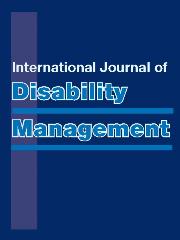Article contents
Economic Incentives for Return to Work in Sweden: In Theory and in Practice
Published online by Cambridge University Press: 23 February 2012
Abstract
A significant problem in Sweden is the large number of people on long-term sickness absence and disability pension. To prevent long-term absenteeism, increased focus has been put on employers and disability management (DM). Effective DM, however, also requires a motivated employee. One way to motivate employees to return to work (RTW), is to provide economic incentives. The aim of the current study was to investigate the occurrence of economic incentives for people in Sweden to RTW after long-term sickness absence. The study is based on three fictitious cases. The results show that only marginal economic incentives presently exist in the Swedish RTW system. The necessity for economic incentives in the RTW process can, of course, be usefully debated. Research suggests, however, that such incentives play a part in the RTW process. With stronger economic incentives for the employee, the effectiveness of DM and prospects of job return would, arguably, be enhanced.
- Type
- Articles
- Information
- Copyright
- Copyright © Cambridge University Press 2006
- 5
- Cited by




